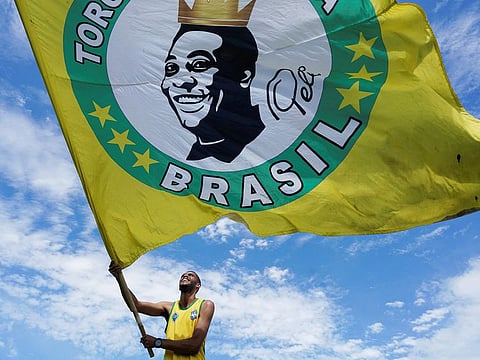Pele never leveraged his charisma for political ends
The king was special because he showed Brazil the beauty of a level playing field

The simplest way to capture the achievements of Pele is to tally the numbers. In two decades, he scored 1,283 goals — 1,000 of them before he was 30 and 95 wearing the national team colours. He helped bring home three of Brazil’s five World Cups, a feat unequalled by any other player to this day.
But soccer is not a ledger, and Pele’s magic doesn’t fit in a trophy room. When cancer killed him at age 82, the country lost a bit of its soul. From 1956 to 1977, he brought grace and majesty to the world’s most popular sport.
He also became Brazil’s most enduring brand, the boyish star with a halogen smile, who put soft power in short pants and joyfully conflated the country’s name with his own.
Ask the Nigerians, who saw combatants in their bloody civil war briefly put down their weapons to watch Pele perform in a 1969 exhibition game.
Or the Brazilian-led United Nations peacekeepers who in 2004 promoted a “peace match” in strife-torn Haiti, parading their national team stars atop armoured cars through the streets of Port-au-Prince — a brazen bet on the sort of football diplomacy that Pele invented. If the truce was short-lived, Pele’s aura lingered, garnering Brazilian travellers instant bonhomie.
But Pele’s most enduring effect was at home. More than a star athlete, he was a symbol of a nation in transformation. He came up in an era when Brazil was stirring to international ambitions and world-class industry. Bossa nova was on the Victrola and Carnaval cranked the street party up to 11.
Dancing emblem of Brazilian confidence
Glissading over the grass, Pele made impossible moves look effortless and sent parabola kicks home from ridiculous angles, with right foot and left, turning even the missed shot into a thing of beauty. He seemed a dancing emblem of Brazilian confidence and aspiration.
In the 1980s, Brazilian cinemas would play grainy reels of classic soccer matches, scored to the infectious sound of Que bonito e, or “how beautiful it is.” This was the game and the beat that would define Brazil, and Pele would be its icon.
Pele never leveraged his charisma for political ends. He repeatedly declined invitations to run for office or even join a party.
This fawning attention brought Pele unflattering comparisons — not least with Muhammad Ali, his contemporary and international coeval, whose outspokenness against racism and the Vietnam War made him both an exemplar of political defiance and a target of official rancour.
Pele was also a beacon. Futebol, the Brazilian anthropologist Roberto DaMatta once told me, isn’t just bread and circus. It’s a game that Brazilians know is fair, has transparent rules and is played on a level playing field.
What counts on the pitch is how you play, not your colour, your bank account or who you know. “Pele became king because he worked for it clearly, on an open, green field,” DaMatta wrote recently.
In a country as socially fractured and unequal as Brazil, where money is power, Pele represented another possibility. He still does.
Bloomberg
Mac Margolis, an adviser to the Brazilian Igarape Institute, writes frequently about Latin America. He is the author of “The Last New World: The Conquest of the Amazon Frontier.”


